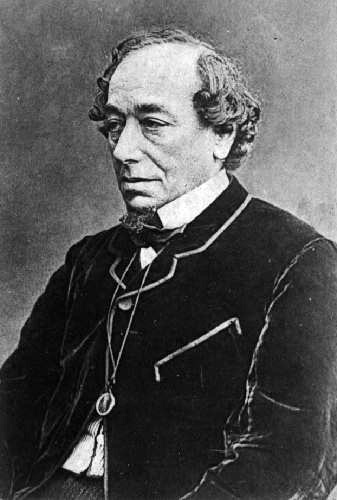Benjamin Disraeli najznámejšie citáty
Benjamin Disraeli Citáty o láske
Potvrdené výroky
Zdroj: MÜHS, Wilhelm: Slovom srdca, 365 myšlienok o láske. Bratislava: Nové mesto, 2000, s. 200. ISBN 80-85487-61-6
Benjamin Disraeli citáty a výroky
Benjamin Disraeli: Citáty v angličtine
Zdroj: Speech in the House of Lords (20 February 1877), cited in William Flavelle Monypenny and George Earle Buckle, The Life of Benjamin Disraeli, Earl of Beaconsfield. Volume II. 1860–1881 (London: John Murray, 1929), p. 994.
“The sweet simplicity of the three per cents.”
Zdroj: Books, Coningsby (1844), Endymion (1880), Ch. 96. Compare: "The elegant simplicity of the three per cents", Lord Stowell, in Lives of the Lord Chancellors (Campbell), Vol. x, Chap. 212.
Zdroj: Upon hearing of the death of Napoléon, Prince Imperial of the House of Bonaparte in Africa (1879); cited in James Anthony Froude, Lord Beaconsfield (1890), p. 213.
Zdroj: Letter to a working men's club (1867), quoted in William Flavelle Monypenny and George Earle Buckle, The Life of Benjamin Disraeli, Earl of Beaconsfield. Volume II. 1860–1881 (London: John Murray, 1929), p. 297.
Zdroj: Letter to Lord John Manners, referring to the tactics of Prime Minister Sir Robert Peel (17 December 1846), cited in William Flavelle Monypenny and George Earle Buckle, The Life of Benjamin Disraeli, Earl of Beaconsfield (Vol. 2) (1913), p. 337-338.
“Candour is the brightest gem of criticism.”
Isaac D'Israeli, The Curiosities of Literature, "Literary Journals".
Misattributed, Isaac D'Israeli
“In politics nothing is contemptible.”
Book VI, Chapter 4.
Books, Coningsby (1844), Vivian Grey (1826)
Speech http://hansard.millbanksystems.com/commons/1849/feb/01/address-in-answer-to-the-speech in the House of Commons (1 February 1849).
1840s
Book V, Chapter 1.
Books, Coningsby (1844), The Young Duke (1831)
“The sense of existence is the greatest happiness.”
Part 3, Chapter 1.
Books, Coningsby (1844), Contarini Fleming (1832)
“He was fresh and full of faith that "something would turn up."”
Bk. III, Ch. 6.
Books, Coningsby (1844), Tancred (1847)
Speech http://hansard.millbanksystems.com/commons/1844/feb/16/state-of-ireland-adjourned-debate-fourth in the House of Commons (16 February 1844).
1840s
“When little is done, little is said; silence is the mother of truth.”
Bk. IV, Ch. 4.
Books, Coningsby (1844), Tancred (1847)
“Protection is not a principle, but an expedient.”
Speech http://hansard.millbanksystems.com/commons/1845/mar/17/agricultural-interest in the House of Commons (17 March 1845).
1840s
Zdroj: Speech http://hansard.millbanksystems.com/commons/1863/feb/05/address-to-her-majesty-on-the-lords in the House of Commons (5 February 1863).
1830s
Varianta: Yes, I am a Jew, and when the ancestors of the right honorable gentleman were brutal savages in an unknown island, mine were priests in the temple of Solomon
Zdroj: Reply to a taunt by Daniel O'Connell http://www.victorianweb.org/history/pms/dizzy.html
Zdroj: Early appearance in The Russian Mephistopheles, Hunterberg, Max, 105-106, 1909, Glasgow, John J. Rae https://archive.org/details/russianmephistop00huntiala/page/106/mode/2up,
“Where knowledge ends, religion begins.”
Remark, attributed in John Gordon Stewart Drysdale and John James Drysdale, The Protoplasmic Theory of Life (1874), p. 279 (note).
Sourced but undated
Speech http://hansard.millbanksystems.com/commons/1846/may/15/corn-importation-bill-adjourned-debate in the House of Commons (15 May 1846).
1840s
“To govern men, you must either excel them in their accomplishments, or despise them.”
Letter to his father from Malta (25 August 1830), cited in Lord Beaconsfield's Letters, 1830-1852 (1882), p. 32
1830s
“We should never lose an occasion. Opportunity is more powerful even than conquerors and prophets.”
Tancred, Chapter 46.
Books, Coningsby (1844), Tancred (1847)
“At present the peace of the world has been preserved, not by statesmen, but by capitalists.”
Zdroj: Letter to Mrs. Sarah Brydges Willyams (17 October 1863), quoted in William Flavelle Monypenny and George Earle Buckle, The Life of Benjamin Disraeli, Earl of Beaconsfield. Volume II. 1860–1881 (London: John Murray, 1929), p. 73
“Everyone likes flattery, and when you come to Royalty you should lay it on with a trowel.”
In a letter to Matthew Arnold, as quoted in Stanley Weintraub, Victoria. Biography of a queen (1987), p. 412.
Sourced but undated
Isaac D'Israeli, Curiosities of Literature, "Quotation".
Misattributed, Isaac D'Israeli
“Seeing much, suffering much, and studying much, are the three pillars of learning.”
A Welsh triad cited in A Vindication of the Genuineness of the Ancient British Poems of Aneurin, Taliesin, Llywarch Hen, and Merdin (1803), by Sharon Turner, reads, "The three pillars of learning; seeing much, suffering much, and studying much". This was quoted from Turner by Isaac D'Israeli in his The Amenities of Literature (1841) and, through the confusion of father with son, has come to be falsely attributed to Benjamin Disraeli.
Misattributed
“If it is not necessary to change, it is necessary not to change.”
Attributed to Edmund Burke, to William Gerard Hamilton, to George Bernard Shaw, to John F. Kennedy (who quoted it) and to Benjamin Disraeli, it was actually said by Lucius Cary, 2nd Viscount Falkland in a speech in the House of Commons on 1641-11-22.
Misattributed
Zdroj: Speech http://hansard.millbanksystems.com/commons/1871/aug/08/third-reading in the House of Commons (8 August 1871).
